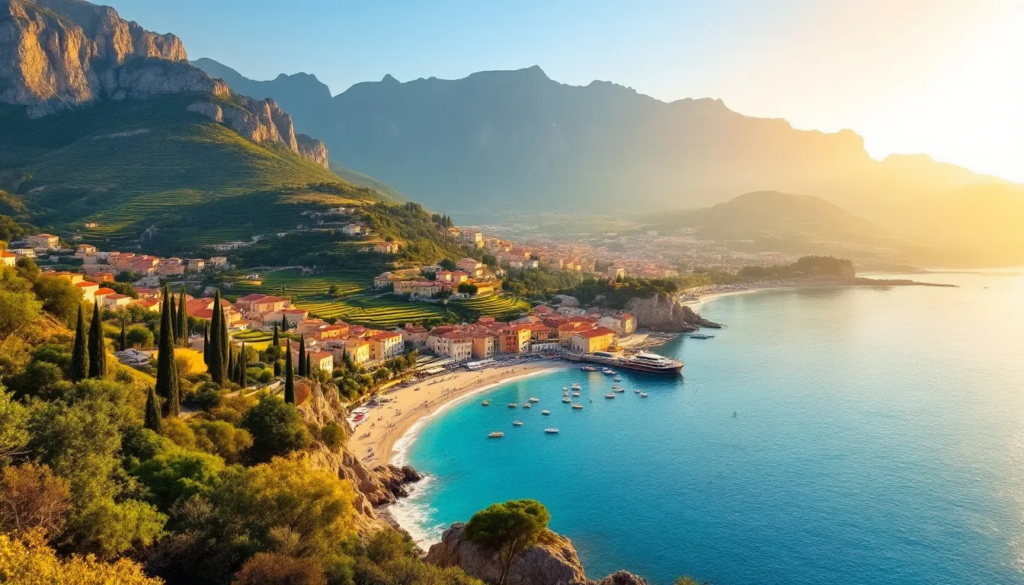Planning your dream trip to Italy can be exciting, but also overwhelming. With so many iconic cities, breathtaking landscapes, and regional experiences to choose from, knowing the best way to plan a trip to Italy helps you make the most of your time. Whether you’re drawn to Renaissance art, charming coastal towns, or authentic Italian cuisine, a well-structured plan ensures your journey feels effortless and unforgettable.
At True Colors of Italy, we help travelers uncover the hidden side of the country, especially the Le Marche region, a place that combines coastal beauty, medieval villages, and authentic culture without the crowds. Below, you’ll find a step-by-step guide to help you organize your trip, balance your itinerary, and experience Italy like a local.
Step 1: Choose the Right Time to Visit Italy
The best way to plan a trip to Italy starts with timing. Spring (April–June) and fall (September–October) offer ideal weather, fewer tourists, and lively festivals. These shoulder seasons let you enjoy outdoor dining, scenic hikes, and cultural events without the summer rush or winter closures.
Seasonal Highlights
Choosing when to visit affects not just your comfort but also what you’ll experience.
- Spring: Blooming landscapes, wine tastings, and mild temperatures make it perfect for central regions like Tuscany and Le Marche.
- Summer: Great for coastal adventures, like sailing along the Conero Riviera or visiting Lake Como, but prepare for heat and higher prices.
- Autumn: Harvest festivals, truffle markets, and colorful countryside views.
- Winter: Magical for art lovers and holiday markets in major cities like Rome, Florence, and Venice.
| Month | Weather (°C) | Best For |
|---|---|---|
| April–June | 18–25 °C | Sightseeing, local festivals, hiking |
| July–August | 25–35 °C | Beach holidays, island escapes |
| Sept–Oct | 17–24 °C | Wine harvest, fewer crowds |
| Nov–Feb | 5–14 °C | Museums, indoor attractions |
Expert Tip: For an authentic escape, visit Le Marche in late May, warm enough for sailing the Adriatic yet peaceful enough to enjoy medieval hilltop villages without crowds.
Step 2: Pick the Perfect Regions for Your Itinerary
Italy offers a mix of iconic cities and under-the-radar gems. The best trip blends both, spending a few days in classic destinations and the rest exploring lesser-known regions where local life thrives.
Classic First-Timer Route (Rome – Florence – Venice)
Most first-time travelers begin here.
- Rome: The Eternal City, home to the Colosseum, Roman Forum, Trevi Fountain, and Vatican Museums.
- Florence: Birthplace of Renaissance art, visit the Uffizi Gallery and admire the architecture of Piazza del Duomo.
- Venice: Lose yourself among canals, gondola rides, and Renaissance palaces near the Grand Canal and Rialto Bridge.
These cities define the “must-see Italy,” but they also attract heavy tourism. That’s why balancing them with quieter regions adds depth and calm to your trip.
Discovering Hidden Gems – Le Marche
Tucked between the Apennine Mountains and the Adriatic Sea, Le Marche embodies authentic Italy, rolling vineyards, cobblestone streets, and coastal cliffs untouched by mass tourism.
A perfect example is the Conero Riviera Adventure, a one-day sailing tour offered by True Colors of Italy. Guests explore turquoise waters, small fishing villages, and seaside caves while sipping Prosecco aboard a private sailboat. This type of experience shows Italy’s beauty beyond the usual postcards.
Balancing Cities and Countryside
For a 10-day trip:
- Spend 4–5 days in major cities for culture and art.
- Dedicate 3–4 days to a region like Le Marche or Umbria for local immersion.
- Leave 1 day open for spontaneous exploration; often, your best memories come from unplanned discoveries.
| Trip Length | Focus | Example Plan |
|---|---|---|
| 7 Days | City Highlights | Rome – Florence – Venice |
| 10 Days | Cities + Countryside | Rome – Le Marche – Florence |
| 14 Days | In-Depth Culture | Le Marche – Tuscany – Amalfi Coast |
Step 3: Plan Your Budget and Travel Logistics
Even the most exciting trip needs a realistic plan. Mapping out your budget and logistics early will save time and stress.
Average Costs
A mid-range 10-day Italy trip typically costs $2,500–$4,000 per person, covering accommodations, meals, transportation, and guided tours. Boutique travelers who choose private experiences should budget around $500–$700 per day, depending on the region and season.
| Expense | Average Cost (Per Day) | Notes |
|---|---|---|
| Hotels / B&Bs | $120–$250 | Depends on location and comfort |
| Meals | $60–$100 | More in major cities |
| Local Tours / Excursions | $100–$300 | Varies by group size |
| Transport | $40–$80 | Train or rental car |
| Travel Insurance | $50–$100 (total) | Recommended for trip cancellations and medical emergencies |
Getting Around
- High-Speed Trains: Efficient for travel between major cities (Rome–Florence–Venice).
- Rental Cars: Ideal for regions like Le Marche, Tuscany, or the Italian Alps, where small towns aren’t well-connected.
- Private Transfers: Comfortable and flexible, perfect for travelers wanting door-to-door service.
Booking Timeline
- 6 Months Before: Book international flights (use Google Flights to compare).
- 3–4 Months Before: Reserve boutique accommodations and private tours.
- 1 Month Before: Confirm train tickets, rental cars, and travel insurance.
Insider Tip: Italy’s summer months bring extreme heat and high prices. Visiting during shoulder season gives you better deals and cooler weather.
Step 4: Curate Unique Experiences and Local Tours
The best way to plan a trip to Italy isn’t just about the itinerary; it’s about crafting memorable experiences that connect you with local culture.
Why Small-Group & Private Tours Matter
Small groups allow flexibility, personal interaction, and authentic connections with local guides. Instead of rushing through landmarks, you’ll understand the stories behind them. This is the approach True Colors of Italy takes: tours limited to eight guests, led by certified guides who share insider tips and genuine hospitality.
Beyond the Beaten Path
If you’ve already visited Rome or Florence, Le Marche’s coastline offers something refreshingly different. The Conero Riviera Adventure combines a scenic sailboat trip with Prosecco, swimming, and storytelling from a local skipper. Inland, the Grotte di Frasassi Expedition reveals Europe’s largest cave network, while the Ancient Grottos of Salinello unearths 12,000 years of human history.
Finding Trusted Boutique Operators
Before booking:
- Check for licensed guides and official partnerships with regional tourism boards.
- Read verified traveler reviews.
- Confirm small group sizes (under 10 people).
- Ask about custom itineraries and language options for smoother communication.
These steps ensure your guided tours deliver both comfort and authenticity, hallmarks of an unforgettable Italian adventure.
Step 5: Build Your Custom Itinerary
A balanced itinerary helps you see Italy without feeling rushed.
Here’s a sample 7-day itinerary blending major highlights with hidden treasures.
| Day | Destination | Experience |
|---|---|---|
| 1 | Rome | Explore the Colosseum, Roman Forum, and Trevi Fountain |
| 2 | Rome → Le Marche | Train to Ancona, scenic drive to Conero Riviera |
| 3 | Conero Riviera | Private sailing tour and coastal dining |
| 4 | Le Marche Countryside | Visit medieval villages and wine tastings |
| 5 | Florence | Renaissance art at the Uffizi Gallery |
| 6 | Florence → Venice | Ride high-speed train; evening gondola ride |
| 7 | Venice | Explore Piazza San Marco, the Rialto Bridge, and fly home |
Leave one night flexible, you might discover a charming town worth extending your stay.
Pro Tip: When traveling in Italy by train, stay near the city center or main station for easy access and shorter transfer times.
Expert Tips for a Stress-Free Italy Trip
Traveling across Italy is a joy when you plan smartly.
- Travel Light: Many train stations have stairs and cobblestone streets; rolling heavy luggage is difficult.
- Book Hotels Early: In shoulder season, small boutique stays fill quickly.
- Learn Key Italian Phrases: Simple greetings go a long way in small shops and restaurants.
- Stay Hydrated: Summer can bring extreme heat; carry a refillable bottle.
- Download Offline Maps: Especially in rural areas where signals can drop.
These small habits make a big difference in comfort and confidence during your Italian adventure.
Conclusion
Planning your dream Italian getaway doesn’t have to be complicated; it just needs intention. By choosing the right time to travel, balancing iconic cities with hidden regions like Le Marche, and adding authentic experiences such as private day tours, you’ll create a journey that feels both personal and effortless. The best way to plan a trip to Italy is to combine structure with spontaneity, letting professional guidance handle the details while you focus on savoring every moment from cobblestone streets and coastal sunsets to the warmth of local hospitality that makes Italy unforgettable.
Looking for a more authentic, stress-free way to experience Italy? True Colors of Italy offers private, all-inclusive day tours through the heart of Le Marche, where culture, nature, and cuisine come together. Whether you’re traveling solo, as a couple, or with close friends, our curated excursions are designed for travelers who value comfort, connection, and local insight. Contact us today to plan your personalized Italian adventure.
FAQs
How do you start planning a trip to Italy?
Start by defining your goals, art, food, or relaxation, then choose 2–3 regions that match. Set your budget early, research transportation, and book accommodations at least three months ahead to secure the best options.
How far in advance should I plan a trip to Italy?
For popular destinations or boutique tours, plan three to six months. High-season trips (June–September) may require six to nine months for flights and hotel reservations, especially in cities like Rome and Venice.
How much should I expect to spend on a trip to Italy?
A 10-day trip averages $2,500–$4,000 per person, including flights, lodging, meals, and activities. Add a small cushion for wine tastings, cooking classes, or private guided tours to make your trip special.
What’s the best way to travel between Italian cities?
High-speed trains are fast and affordable for major routes like Rome–Florence–Venice. For smaller towns or regions like Le Marche, rent a car or book a private transfer to reach charming destinations off the beaten path.












